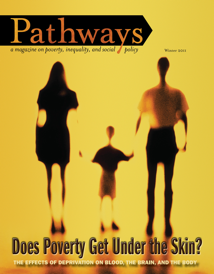The Effects of Deprivation

Can poverty literally get "under the skin?" This issue unpacks the relationship between poverty and toxic stress.
Table of Contents (Winter 2011)
HOW POVERTY GETS UNDER THE SKIN: THE EFFECTS OF DEPRIVATION ON BLOOD, THE BRAIN, AND THE BODY
Jack Shonkoff describes how poverty really does get under the skin, how it harms the cognitive development of children exposed to it, and what we can do to break this entrenched cycle.
Gary W. Evans, Jeanne Brooks-Gunn, and Pamela Kato Klebanov develop a new “chain model” that focuses on the chaotic environment that childhood poverty creates, how that chaos generates stress and cognitive dysfunction, and how such dysfunction in turn leads to academic underachievement.
Greg J. Duncan and Katherine Magnuson argue that we can combat the effects of poverty-induced stress by providing income support to vulnerable families with young children.
Intervention
The longstanding view among politicians is that we should first find out what works to reduce poverty and then "scale it up." But Robert C. Granger upends this conventional wisdom by suggesting that we'd best figure out why and under what conditions a policy works before blindly adopting it everywhere.
Research in Brief
New research on whether minimum wage jobs lure high school students to drop out; how prisoners rack up surprising amounts of debt behind bars; a rigorous assessment of long-term trends in economic insecurity; and other cutting-edge research.
Trends
The pitched debates about immigration law have focused our attention on what immigration law should do rather than what it actually does. Tomás R. Jiménez and Laura López-Sanders take a dispassionate look at the sometimes perverse and unintended effects of U.S. immigration policy in recent decades.
